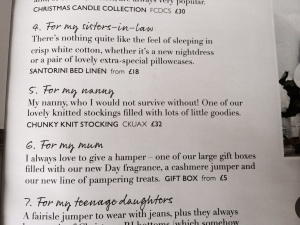With the post this morning a catalogue from The White Company came through my door.

I started to flick through it while waiting for the kettle to boil and saw a guide to gifts you might want to give to special people in your life. Alongside the suggestions for things for sisters-in-law and teenage daughters, I saw that number 5 on the present shopping list was a gift suggestion for ‘my nanny’.
The employment of nannies and other domestic workers has crept back into our culture after a couple of decades of absence. Moments like this, which make clear the assumption that ‘everyone’ (or at least everyone who can afford to shop with White Company) has a nanny, matter. They are markers in history, where we can see social trends emerging. Official data on the employment of domestic workers are unhelpful, they miss the people employed off the books and often lump together those doing similar roles in domestic and collective settings, so indicators like this tell us about how society is changing. I remember the first time I saw a house advertised as having a ‘nanny flat’, rather than the granny flat it would previously have been. It says so much about the changes in care work and expectations; rather than a household needing space so that they can care for an elderly relative, they now need space for the person who is going to help care for them.
As someone who researches paid domestic work in contemporary Britain I often struggle to convince people of the importance, or relevance, of my work. To many it seems too niche, a strange thing to be obsessed by in the modern world, perhaps something that happens in Singapore or Saudi Arabia but not in British suburbia. But each year I see the terrain shifting a little, as slowly the assumption that domestic service was ‘gone for good’, something that had disappeared with coal fires and chamber pots, is replaced with the realisation that it is a growing, through still hidden activity. So the White Company Christmas catalogue is not so much a record of retailing practices as of a significant social change.


